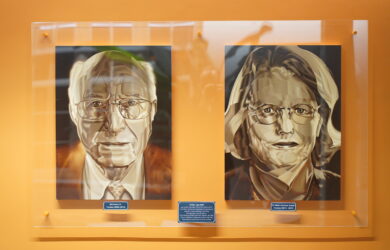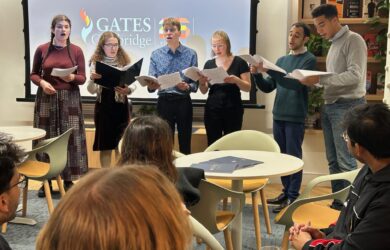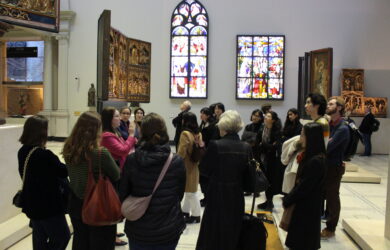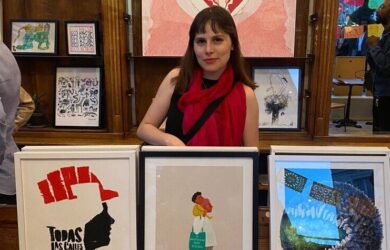Kathelijne's paper in the journal Primates reveals the first evidence that chimpanzees use tools to cut up their food was covered by the BBC in December 2009 and has generated a lot of interest.
She had noticed as early as 2004 that there were some branches with traces of fruit lying below particular trees near where the chimpanzees she was studying were living. “This triggered something in my mind which I decided to follow up for my PhD with systematic monitoring,” says Kathelijne. In March 2008, her team found evidence of tools being used to open large fruits, including rocks with fruit fibres on them. “It was very exciting and quite hard to find because chimpanzees can carry their food so there is often a large area around the fruit trees that you need to search,” she says. She adds that it is hard to know if cutting up food is a skill which the chimps have only recently acquired.
Kathelijne has wanted to study chimpanzees since she was a six year old growing up in south west Holland and saw them on tv. “I was always fascinated by animals and my mum who is a photographer shares my interest in nature,” she says. “When I found out you could study chimpanzees it just lodged in my head. I decided to study Biology at university with the goal of going to Africa to study wild chimpanzees.” She has been studying the animals since returning from an exchange trip to the University of Wisconsin-Madison in 2002 as part of her undergraduate degree in Biology at Utrecht University. UWM had very good courses in ecology and primate behaviour and when Kathelijne returned to the Netherlands for her Masters degree she opted to study captive chimpanzeess at a local zoo, looking at how chimpanzees manage conflicts, whether they make up and which individuals are most likely to make up. She discovered that male chimpanzees who form coalitions to fight others were most likely to reconcile as they were valuable to each other. Females were much less likely to make up.
Since 2003, initially for her final masters research project, she has been studying chimpanzees in the wild in the remote Nimba Mountains of Guinea in West Africa. For the project she worked with Kyoto University which had a research site in the village of Bossou in southeastern Guinea. In 2003, she expanded the research to the Nimba Mountains and built a camp there. For her research Kathelijne is looking at the chimps’ use of so-called ‘elementary’ technology, both in foraging and in nest-building. She is specifically interested in why some of the nests they build are on the ground rather than in trees, as is the case with chimps in other regions.
Her research involves not only monitoring the fruiting patterns of trees in the forest and insect density to see if this in part explains the use of tools in foraging, but also extracting the DNA from genetic samples taken from the chimpanzees’ nests to see if particular individuals, for instance, males or females, are involved in particular types of nest-building behaviour.
It has taken some time to get the chimps used to a human presence and Kathelijne and her team have set up motion trigger cameras to obtain additional information. At first the chimpanzees were afraid of the human observers, as well as curious, but a few individuals have got used to them now.
As well as studying chimpanzee behaviour, Kathelijne has been involved in local environmental education projects, going from village to village talking about the chimpanzees and showing film footage of them. “People are really interested,” she says. “We show them footage of chimps who live near them in the wild, but which they don’t get to see up close as the chimps are wary of humans.” She has also been involved in development projects such as building schools, wells and fish farming.
Kathelijne decided to study at Cambridge when her prospective supervisor, Professor Bill McGrew, an expert in primate culture, got a position at Cambridge in 2005. He could not take any research students on for the first year so from 2005-2006 she taught animal behaviour at Utrecht and went to Guinea to set up a pilot study for her PhD and to keep the site in the Nimba Mountains running.
It was only when she applied to Cambridge that she found out about the Gates Cambridge scholarship programme. Her interview was rather unusual. She had had a brief informal interview before she left to do her fieldwork and then had a one to one satellite phone call. “It was quite unorthodox,” she says. “I was more nervous about the phone connection breaking down than the actual phone call.”
She spent most of her first year of her PhD in Cambridge, based at St John’s College and got a lot out of it, attending lots of Gates events, lectures, workshops and travelling around the UK with her Gates colleagues. Even so, she had time out to attend international conferences and do a research trip to Harvard.
After more than a year of fieldwork, she returned to Cambridge to do laboratory work and write up her thesis. It was a bit of a change from her work in the field. “The local guides and I camp in the middle of the forest in three huts near a river. There is no running water. We carry all our food provisions from the nearest village for the 10 days that we stay there, then return to Bossou for five days to rest and get supplies and do admin,” she says. “At the camp, life is very simple – we get up at daylight, have breakfast, decide what to do for the day, climb up and down the mountains taking measurements, wash in the river, eat dinner, chat around the campfire and go to sleep when it gets dark. It’s very different from formal hall at St John’s!
Coming back to the western world can be quite a culture shock.”
Kathelijne hopes to finish her PhD later in 2010 and wants to continue her research after this. Her next research article will be focussing on the genetic information she has collected.












